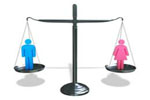100 or 200 years to achieve gender parity
 An International Labour Organization report warns that achieving gender parity on company Boards could take between 100 and 200 years.
An International Labour Organization report warns that achieving gender parity on company Boards could take between 100 and 200 years.
13.01.2015
"If action were not undertaken, it could take between 100 and 200 years to achieve gender parity on boards”, warns Deborah France-Massin, one of the ILO director. “It is time to break down the barriers. Women on Boards is simply good for business”.
According to the ILO report Women in Business and Management: Gaining Momentum, in 80 out of the 108 countries evaluated, the proportion of women in leading positions has increased in recent years. However, only 5% of world CEOs are women.
The report identifies as main causes the fact that women continue to take on the majority of family and domestic responsibilities and that the business culture is still dominated by men.
Aiming to promote gender equality, the ILO report make some suggestions. It encourages “flexible solutions” in order to achieve a work-life balance, as well as some measures to protect maternity and initiatives against sexual harassment and cultural barriers.
“Our research shows that the more women in labour market, the more increase in global growth and competitiveness. Moreover, a growing number of studies are showing positive links between women in companies and its development”, points out France-Massin.
The report also calls for gender awareness-raising policies so men and women enjoy the same rights.
Jamaica is the country with more women on boards, 59,3%, and Yemen is the last one. Spain is ranked 57th, 30%. Norway is the country with more women president of a company, 13,3%.
New historic maximum for greenhouse gases
 The greenhouse gases emissions, that cause climate change, reached a new historic level in 2013, according to the World Meteorological Organization.
The greenhouse gases emissions, that cause climate change, reached a new historic level in 2013, according to the World Meteorological Organization.
The worst August for gender-based violence since 2009
 Seven women have been murdered by their male partners in August in Spain, making this month the worst for gender-based violence since 2009.
Seven women have been murdered by their male partners in August in Spain, making this month the worst for gender-based violence since 2009.
Spain lags behind in female participation in the labour force
 According to a report prepared by PwC, Spain ranked 23th in the OECD 27 countries list regarding gender equality in the labour market. In Spain, women represent 60% of graduates but only 45% of workers. However, there is hope.
According to a report prepared by PwC, Spain ranked 23th in the OECD 27 countries list regarding gender equality in the labour market. In Spain, women represent 60% of graduates but only 45% of workers. However, there is hope.
1.172 hate crimes in Spain in 2013
 A report by the Spanish Ministry for Home Affairs quantifies a disturbing reality: the hate crimes ascent in Spain.
A report by the Spanish Ministry for Home Affairs quantifies a disturbing reality: the hate crimes ascent in Spain.
App against gender violence in Brazil World Cup
 Posters, billboards and ads on public transport are promoting during the World Cup in Brazil a new smartphone app that provides information for women who’ve experienced violence.
Posters, billboards and ads on public transport are promoting during the World Cup in Brazil a new smartphone app that provides information for women who’ve experienced violence.
Roma, Swedish, feminist and member of the European Parliament
 Daughter of a Roma woman and a Jew, Soraya Post is Roma, feminist, Swedish and since last Sunday member of the European Parliament, where she has promised to fight against racism and inequality.
Daughter of a Roma woman and a Jew, Soraya Post is Roma, feminist, Swedish and since last Sunday member of the European Parliament, where she has promised to fight against racism and inequality.
Women on boards by law
 Spanish government has adopted a bill which, among other issues, aims to fostering women on companies boards. Diversity awareness is gaining ground.
Spanish government has adopted a bill which, among other issues, aims to fostering women on companies boards. Diversity awareness is gaining ground.
Unexpected support to families in economic crisis?
 An ILO report says a surprising side effect of the crisis in some countries was a lift to families, including better benefits for maternity and parental leave. However, the report also founds that maternity discrimination persists around the world.
An ILO report says a surprising side effect of the crisis in some countries was a lift to families, including better benefits for maternity and parental leave. However, the report also founds that maternity discrimination persists around the world.
What is at stake on May 25
 Abstention is the biggest threat to the European elections to be held in Spain on May 25. But, what is being decided? What are the functions and responsibilities of the European Parliament?
Abstention is the biggest threat to the European elections to be held in Spain on May 25. But, what is being decided? What are the functions and responsibilities of the European Parliament?
Finland and Norway, best countries to be a mom
 Nordic are the top three countries in the world to be a mother, according to Save the Children annual State of the World's Mother Report. Somalia ranked at the bottom of the list, being the country with the worst maternity conditions.
Nordic are the top three countries in the world to be a mother, according to Save the Children annual State of the World's Mother Report. Somalia ranked at the bottom of the list, being the country with the worst maternity conditions.
Women still paid 16% less than men
 The European Commission annual Gender Equality Report reveals that women are still paid 16% less than
men per hour of work, despite having 60% of university graduates being women.
Although there are some advances, equality is still a way long ahead.
The European Commission annual Gender Equality Report reveals that women are still paid 16% less than
men per hour of work, despite having 60% of university graduates being women.
Although there are some advances, equality is still a way long ahead.